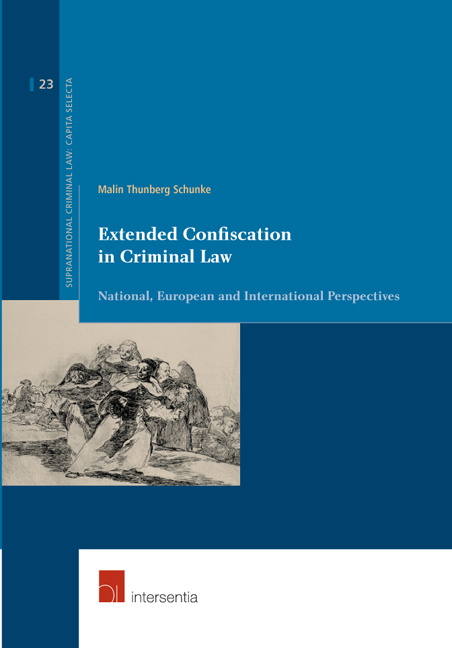Book contents
- Frontmatter
- Preface
- Contents
- Table of Cases
- List of Abbreviations
- Part I Introduction
- Part II Substantive Provisions on Extended Confiscation
- Chapter 2 Legislative Action by the EU
- Chapter 3 Legislation in England and Wales
- Chapter 4 Legislation in Germany
- Chapter 5 Legislation in Sweden
- Chapter 6 Brief Overview of the Legislation in Norway, Denmark and Finland
- Chapter 7 Directive 2014/42/EU: A Reform with Significant Legal Changes?
- Part III The Legal Framework for International Cooperation
- Bibliography
- Index
- About the Author
Chapter 6 - Brief Overview of the Legislation in Norway, Denmark and Finland
from Part II - Substantive Provisions on Extended Confiscation
Published online by Cambridge University Press: 11 October 2018
- Frontmatter
- Preface
- Contents
- Table of Cases
- List of Abbreviations
- Part I Introduction
- Part II Substantive Provisions on Extended Confiscation
- Chapter 2 Legislative Action by the EU
- Chapter 3 Legislation in England and Wales
- Chapter 4 Legislation in Germany
- Chapter 5 Legislation in Sweden
- Chapter 6 Brief Overview of the Legislation in Norway, Denmark and Finland
- Chapter 7 Directive 2014/42/EU: A Reform with Significant Legal Changes?
- Part III The Legal Framework for International Cooperation
- Bibliography
- Index
- About the Author
Summary
NORWAY
THE PROVISION ON EXTENDED CONFISCATION
Norway has a rather broad range of legal powers regarding asset recovery, and the regime on extended confiscation was adopted in 1999. The legal provisions on confiscation are found in the Norwegian Penal Code. This new Penal Code took force on 1 October 2015 (Act of 19 June 2015 No. 65), even though this piece of legislation had already been enacted in 2005. It replaced the Act of 22 May 1902 No. 10 (“Almindelig borgerlig Straffelov”). In substance, the former provision on extended confiscation in this Act (Chapter 2 Section 34a) was thereby kept unchanged.
The Norwegian Penal Code (Chapter 13 Section 68) provides for extended confiscation (“utvidet inndragning”) if the offender is found guilty of a criminal act of such a nature that the proceeds thereof can be considerable, and he has committed:
(a) one or more criminal acts that may collectively be punishable by imprisonment for a term of six years or more, or an attempt at such an act, or
(b) at least one criminal act punishable by imprisonment for a term of two years or more, or an attempt at such an act, and the offender during the five years immediately preceding the commission of the said act has been punished for an act of such a nature that the proceeds thereof can be considerable.
Accordingly, several requirements are set up. It is first required that an offender is found guilty of a criminal act. The triggering offences are identified by a link to certain penalty scales. Decisive here are the penalty scales in question and not the actual penalty imposed in the individual case. An interesting provision in this respect is Chapter 14 Section 79 of the Norwegian Penal Code, which provides that under certain conditions it is allowed to increase the maximum penalty laid down in the penal provision (i.e. double its prescribed limit), if a criminal offence has been committed as part of the activity of an organised criminal group. (The limits hereto and the definition of the term “organised criminal group” is given in the provision.) This means that in such cases the scope for extended confiscation may be somewhat increased.
- Type
- Chapter
- Information
- Extended Confiscation in Criminal LawNational, European and International Perspectives, pp. 179 - 188Publisher: IntersentiaPrint publication year: 2017



